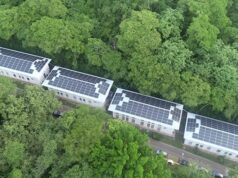
From Walgreens to Target to the doctor’s office…It is safe to say that hemp has made a comeback here in the United States. What most people don’t know is that hemp is far more than your run of a mill CBD concoction. It’s food, fiber, fuel and more. For us here at Anact, we believe that hemp is the future of sustainable textiles due to its performance and sustainable attributes. Here’s why we are excited for the hospitality industry to pave the way in re-introducing this powerful textile.
It’s hard to find a negative when it comes to hemp and all it has to offer. But what is hemp you may be asking? In the words of Brianna Kilcullen, founder of Anact and a hemp hustler: “Hemp is a pretty lethal fiber,” Kilcullen says. “It’s multifaceted in a way that cotton, polyester and nylon are not. You can use the seed for food, the fiber for textiles and the hurd can be used for building homes.” Hemp ticks so many boxes of its potential to impact the world around us in positive ways.
Hemp seems like a new and exciting option in the sustainable fiber world; however the truth is hemp has been around for a long time. Did you know the Declaration of Independence was written on hemp paper, or that the American flag sewn by Betsy Ross was made of hemp fabric, or that George Washington owned hemp farms? Hemp has literally been woven into the fiber of the United States and it was only within the past several decades that we have strayed away from manufacturing hemp domestically. Why may you ask?
Around the 1930s hemp began to meet resistance from corporations in the synthetic textile industry. In 1937 the Marihuana Tax Act was passed into law which taxed and illegalized hemp and destroyed the U.S. hemp industry. While hemp is a cousin to marijuana it contains little to no THC and cannot be used for any drug/recreational purposes. As of 2018, hemp was finally relegalized in the United States and each state is working to legalize the farming and growth of hemp again. In 2019, Anact helped to pass legislation in Florida so we could take it one step closer to reintroduce hemp textile manufacturing domestically. Currently, most of the hemp farming is in China.
Much More Than a Weed
Now that we have broken down the history of hemp better, we can really break down the positive impacts of hemp and why we believe it is the future for sustainable textile production. The plant hemp is technically a weed which means it uses significantly less water, less than both bamboo and conventional cotton. Did you know that conventional cotton is one of the thirstiest plants (using upwards of 50 percent more water to grow) in comparison to hemp? Hemp is also a resilient plant which needs no harsh insecticides or pesticides to grow unlike other plants. This means cleaner and safer environments for the surrounding ecosystems. Hemp is also a regenerative plant which creates biodiversity and reinvigorates the soil. On the performance side, hemp is biostatic which means it resists the growth of bacteria and mildew as well as being naturally hydrophobic due to its molecular structure being hollow. Hemp helps to create a positive supply chain from farmer to customer, without leaving a negative impact on the environment.
Right now, we are seeing a huge uptick in the hospitality industry investing in sustainable and eco-friendly practices and products. One of those reasons is due to customers who are traveling falling in the Millennial and Gen Z generations who not only expect but will pay for sustainable practices for the places they travel to.
This trend can be tied to the COVID experience, where more people are starting to think about their impact on the world and even small experiences like the quality of one’s bedsheets. We believe we will continue to see this trend grow as more people in the industry see the positive impacts of hemp not just on the environment but on the people as well.
Where does Anact fit in to help push the hospitality industry forward? We believe that our towels are the best on the market not just because we use natural plant fibers but also because they perform better than anything else on the market. Anact towels are superior towels because they are: ultra-absorbent, quick drying, and sustainable. Each bath towel saves 526 days of drinking water.
The hemp texture creates a thinner fast drying towel which also has gentle exfoliation for a spa quality experience. Hemp towels are also incredibly durable and with each wash they become softer instead of falling apart. No extra care needs to be taken besides washing with one’s other towels.
While they may run on the more expensive side due to the supply chain now, Anact is still able to offer one of the lowest price points for sustainable towels on the market. Towels which will last your lifetime saving you money while making you feel good too. And when you purchase hemp towels you are voting with your dollar by showing that there is a demand for hemp in the United States which helps us take one step closer to manufacturing hemp for fiber, domestically.
About Anact
Anact is an activist brand which wants to show everyone that even small acts of kindness can lead to great results. One small act by Anact’s founder Brianna Kilcullen was dreaming up and creating the perfect hemp towel. Brianna and Anact have played an integral role in the legalization of hemp in Florida and carving out a hemp market in the United States. If you want to follow along with this woman owned and run sustainable business you can follow their journey on social media @anactgloblal, on their website anact.com, and shoot any questions their way at hello@anact.com.






